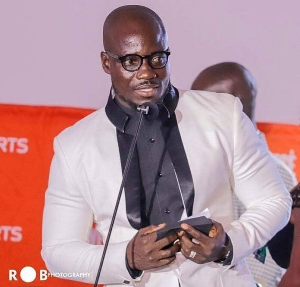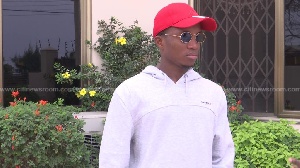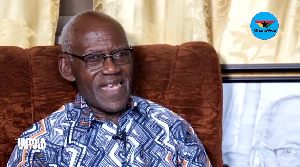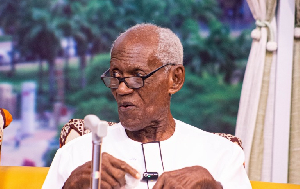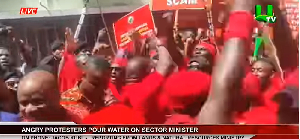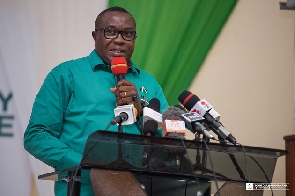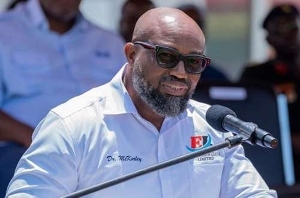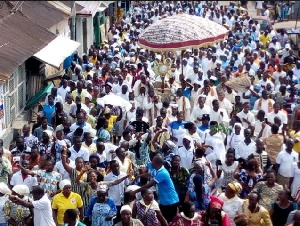 More than 10,000 Catholics are in Jasikan to participate in the Holy Eucharistic Congress.
More than 10,000 Catholics are in Jasikan to participate in the Holy Eucharistic Congress.
The Fourth National Eucharistic Congress in Ghana is being marked in Jasikan with a call on Ghanaian Catholics and the over 10,000 pilgrims in Jasikan to ensure they participated fully in the Holy Eucharist as exhorted by the Second Vatican Council.
Nigerian Cardinal John Olorunfemi Onaiyekan, Archbishop of Abuja, speaking at the opening of the Congress on August 11 on the theme: The Eucharist and the New Evangelization, said, “the Second Vatican Council exhorts people of God to fully participate in the Holy Eucharist which in other words, that we should not just go to Mass spend the time saying rosary or worst still, reading newspapers or gossiping with others at the back of the church.”
He noted that, “Following on the doctrine of the Holy Eucharist as the real presence of the Body and Blood of the Lord Jesus, it follows naturally that the celebration of the Eucharist is the most sacred and holy act of the highest level.”
Therefore, it should never be handled with levity, he added, saying that Priests who celebrate Mass know very well that they have to respect the rules of the church in this matter.
He said the Eucharist belongs to the Church and "it is not for us to treat as we like. Indeed, we must always pray to God that we never be found guilty of disrespecting the Body and Blood of Jesus."
“If we take the trouble to go for Mass at all, we must fully participate in what is going on and keep our hearts and minds fixed on what is happening. Anybody who enters into a Catholic church during Mass ought to see very clearly that something great is happening here," he stated.
According to Cardinal Onaiyekan, the Church over the centuries had developed very elaborate rules about the celebration of the Holy Eucharist.
These rules and regulations, he said, were necessary precisely to maintain the right attitude and approach to the Eucharist itself.
The Cardinal declared: “We know however, that the rules and the laws of the Church in the celebration of the Eucharist are not so rigid that there is no room for the spirit to inspire us in many ways. In particular, especially in the Second Vatican Council the Church has opened a lee way for local Churches in different parts of the world to look into the traditional patrimony of faith and religion of their people and creatively bring some of those elements into the celebration of the Eucharist.”
He added that, “We are now living in a new age where we are quite used to these things. But those who are of our age, sixty and above, will still remember when the Mass in the Catholic Church was uniform all over the world. Now we are in a position to introduce certain elements of our traditional culture into the celebration of Mass, starting with the use of the local languages. But these should not turn the Mass into a social entertainment or disco.”
He indicated that, “Even when we beat African drums, it is always important to maintain the solemnity which the Holy Eucharist deserves. In this regard, we do well to go back to the religious traditions of our people. The spirit has inspired them to express their faith in God with music and dance that are meant precisely for that purpose and not for any daily social celebration.”
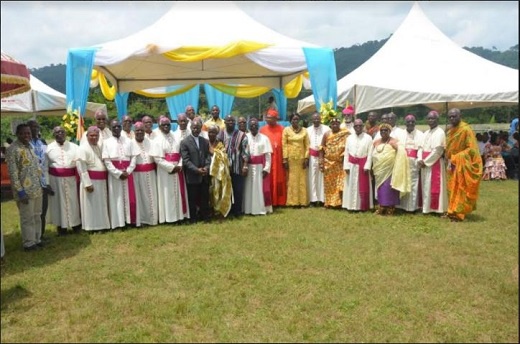
This is an area where the Church in our lands still has a long way to go. Now that we need no longer be afraid to dig into the spiritual patrimonies of our ancestors, we would easily find treasures which the spirit of the Lord has put into our peoples mind ever before the Christian faith came, he added.
According to him, the whole question of inculturation of the liturgy cannot stop at merely bringing drums and gongs into the Church. It must go deeper than that.
Efforts made in this regard need to be very much encouraged.
The opening ceremony was attended by all the Bishops including Most Rev. Philip Naameh, Archbishop of Tamale and President of the Ghana Catholic Bishops’ Conference (GCBC) and Most Rev. Charles Gabriel Palmer-Buckle, Archbishop of Accra and Vice President of the Conference, Most Rev. Gabriel A.A. Mante, Bishop of Jasikan and Most Rev. Mathueu Madega Lebouakehan, First Vice President of the Symposium of Episcopal Conferences of Africa and Madagascar (SECAM).
The Bishop of Keta-Akatsi and Administrator of the Donkorkrom Vicariate and Bishop of Sekondi-Takoradi, were represented by their Vicars General, Rev. Msgr. Peter Huletey and Rev. Msgr. Francis Abuah Quansah respectively.
Cardinal Peter Appiah Turkson, Prefect of the Dicastery for the Promotion of Integral Human Development at the Vatican, who presided over a Votive Mass in honour of the Blessed Virgin Mary on August 12, urged Catholics awaken their faith in the Eucharist by becoming Eucharistic people.
He reminded the pilgrims that the Eucharist is a victory over sin and death and anytime it is celebrated, we sow the seed of the resurrection and new life. He stated that the Eucharist was given to us by God like the manna to feed and nourish our bodies for transformation.
The over 10,000 Catholic pilgrims embarked on a five-kilometer Eucharistic Procession with the Blessed Sacrament through same streets of Jasikan in the Volta Region.
The Bishops of Ghana and some Priests at different stages carried the Monstrance in the palanquin, a duty reserved for the Clergy.
Amid singing and dancing, the pilgrims through the two-hour procession of the Eucharist promoted Christ’s real presence in the Eucharist, as in the light of the example of Pope John Paul II, who took the annual Corpus Christi procession from St. Peter's Square to the streets of Rome.
The procession was carefully planned by the National Steering Committee chaired by Most Rev. Joseph Afrifah-Agyekum.
The seven-day Congress from August 7 to 13 was on the theme: The Eucharist and the New Evangelization.
After the procession, a Eucharistic Durbar was held on the Congress ground with the Adoration of the Blessed Sacrament led by Most Rev. John Yaw Afoakwah, Bishop of Obuasi.
In an Exhortation, Most Rev. Gabriel Justice Yaw Anokye, Archbishop of Kumasi, called on Catholics to ensure that they had deeper adoration of Jesus in the Holy Sacrament, reminding them that Christ was present in fullness and entirety in the Eucharist.
He urged the pilgrims adore Christ in the Blessed Sacrament for their spiritual healing rather than resorting other Churches or Prophets.
As part of the Congress, the pilgrims also took part in a series of Catechism Sessions, which focused on different dimensions of the Eucharist, daily celebration and adoration of the Blessed Sacrament, the Sacrament of the Reconciliation, and Eucharistic Healing Service.
There were Study-sessions earlier for 250 National Delegates, made up of Priests, Religious, youth, men and women, from all the 20 Dioceses. The opening ceremony for the delegate Session was chaired by Bishop Afrifah-Agyekum with Most Rev. Richard Baawobr, Bishop of Wa delivering the Keynote Address.
Topics for the Study Session were The Eucharist and our Care of the Environment by Very Rev. Fr. John Louis; The Eucharist and the Social Media, The Eucharist, by Mr. Ken Ashigbey; The Church’s Dialogue with the Youth by Most Rev. Charles Palmer-Buckle, Archbishop of Accra.
Others were The Eucharist and the Church’s Dialogue with the Poor, the Sick and the Suffering by Most Rev. Emmanuel Kofi Fianu, Bishop of Ho; The Eucharist and the Family by Justice Mrs.Angelina Mornah Domakyaareh; The Eucharist makes the Church, and the Church makes the Eucharist by Rev, Fr. Christopher Vodzogbe; and The Eucharist and the Church’s Ministry to Catholic non-Communicant by Rev. Fr. Vincent Owusu, SVD.
A Eucharistic Congress is a gathering of Priests, Religious and laity to bear witness to the Real Presence of Jesus in the Eucharist. It brings together people from a wide area, and typically involve large open-air Masses, Eucharistic adoration to the Blessed Sacrament, and other devotional ceremonies held over several days.
The primary objective of the 4th National Eucharistic Congress in Jasikan was to take advantage of the context of the 60th Independence Anniversary of Ghana and to use the congress to rededicate the Republic of Ghana and her citizens to the Eucharistic Love of Jesus Christ.
The First Congress took place at Kumasi in 1951, the Second was held in 1998 in Tamale and the Third Congress was again held in Kumasi in 2005 coinciding with the 125th Anniversary of the Catholic Evangelisation in Ghana in 1880 and the 25th Anniversary of Pope St. John Paul’s visit to Ghana in 1980.

